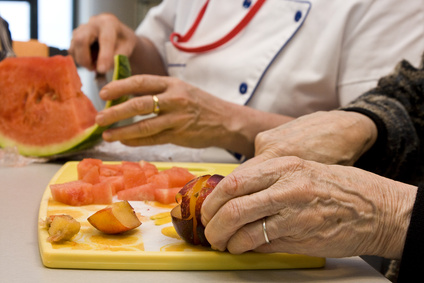As we age, prioritizing digestive health becomes paramount for overall well-being. Fortunately, simple yet effective dietary adjustments can significantly contribute to maintaining a healthy digestive system in the elderly.
 1. Fiber-rich diet:
1. Fiber-rich diet:Incorporating ample fiber into the diet is a cornerstone of promoting digestive health in seniors. Fiber aids in preventing constipation, promoting regular bowel movements, and supporting a healthy gut microbiome. Whole grains, fruits, vegetables, and legumes are excellent sources of dietary fiber.
Ask questions regarding retirement homes to our experts
Adequate hydration is essential for seniors to combat the natural decrease in water retention that comes with aging. Staying hydrated helps prevent constipation and supports the smooth functioning of the digestive system. Encourage the intake of water, herbal teas, and hydrating foods like fruits and soups.
Include lean sources of protein, such as poultry, fish, tofu, and legumes, in the elderly diet. Protein is crucial for muscle maintenance, including the muscles involved in the digestive process. This can help mitigate age-related decreases in muscle tone within the digestive tract.
Probiotics, found in yogurt and fermented foods, and prebiotics, present in foods like bananas and onions, play a vital role in supporting a healthy gut microbiome. These beneficial bacteria aid in digestion, nutrient absorption, and immune function.
Reducing the intake of processed and high-fat foods is advisable. Such foods can contribute to digestive discomfort and may exacerbate conditions like acid reflux. Opt for whole, unprocessed foods to provide essential nutrients without unnecessary additives.
Encourage seniors to consume smaller, more frequent meals rather than large, heavy ones. This approach can ease the digestive process, prevent bloating, and manage conditions like gastroesophageal reflux disease (GERD).
Promote mindful eating practices, encouraging seniors to savor each bite and eat in a relaxed environment. This can enhance the digestive experience, as stress and hurried meals can contribute to digestive discomfort.
Individual dietary needs vary, and consulting with healthcare professionals, including dietitians, is crucial. They can provide personalized recommendations based on health conditions, medications, and specific nutritional requirements.
In conclusion, fostering digestive health in the elderly involves embracing a well-rounded and mindful approach to nutrition. By incorporating fiber, staying hydrated, and making informed dietary choices, seniors can enjoy a higher quality of life with a digestive system that functions optimally.
We are here to help you choose a retirement home or facility best suited to your needs. Do not hesitate to contact us at the following number: 343 309 5289.

Find a suitable senior residence